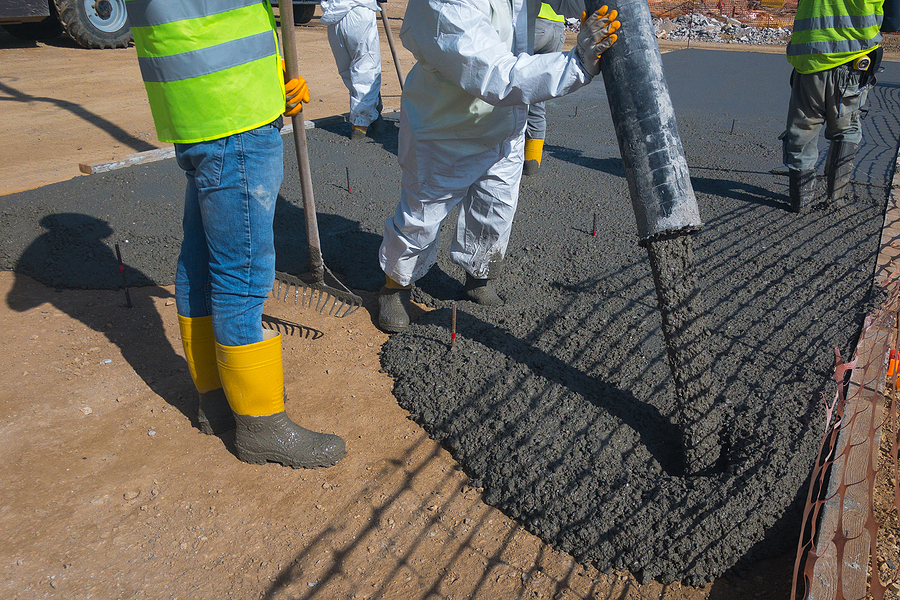Many Houston, Texas homeowners strive to have all of their outside projects completed during the summer months when the weather is stable and the temperatures are warm enough for most jobs. While it’s true that there are less issues with concrete during the warmer months, extremely high temperatures can cause issues during the pouring and installation process. You can minimize these problems by having a licensed professional install the concrete, as well as a few additional steps. Keep reading below to learn more about pouring concrete during hot weather and what temperatures are best for the material.
Why Is Temperature Important?
Simply put, the outdoor temperature is important when pouring concrete because extremely hot or cold air can affect the chemical reactions that need to happen for proper curing. When temperatures are very cold or close to freezing, it can cause the water inside the concrete to expand and crack the material. When temperatures are too high, it can also lead to a variety of issues with the final product for your driveway.
What Are The Risks Of Pouring With Hot Temperatures?
There are several risks associated with pouring concrete during hot temperatures, many of these affecting the overall strength and durability of the materials. Many homeowners are surprised to learn that hot weather can cause the entire driveway to shrink and crack from the shortened setting time. Below you can find some of the most common issues that people face when pouring concrete during the hot Houston summer temperatures.
Reduced Material Strength
When the air is at a high temperature, typically above 77 degrees Fahrenheit, it can cause the concrete to cure at a faster rate than normal. When this occurs, the material is not able to hydrate properly and may become cracked, weak, or even begin to crumble. It’s very important that your driveway dries and cures properly because structural integrity is crucial for functionality. You can discuss concerns about temperature or the curing process with your professional team of installers.
Slump Loss
When referring to concrete and “slump,” it means to consider the consistency and fluidity of the material. Concrete consists of cement, water, sand, and rock, so when combined the slump is the overall consistency of the mixture. Professionals aim for a four-inch slump for installation because it provides the best final results. Slump that is above or below average can cure with a variety of issues such as reduced strength and a cracked surface. It’s important to let a concrete expert install your materials, especially in high temperatures, as they have the proper admixtures to ensure your concrete reaches the proper slump.
Evaporation and Shrinkage
While it’s true that all concrete will shrink and change volume as it dries, when the material cures too fast or slow, it can lead to excess shrinkage. The issue lies with evaporation and the removal of too much moisture that causes the slab to shrink in size. This can not only cause problems with the functionality and design of your driveway, but it can also lead to serious issues with structural integrity. Many DIYers think the solution is to add more water to the concrete mixture but this can actually cause more problems.
Cracking
Cracking on the surface of a concrete driveway can occur for a variety of reasons, including hot temperatures, severe wind, or excessively dry air. Even if the visual disturbances of cracks in the concrete do not bother you, there is the risk of further problems from moisture and fluctuating temperatures over time. If moisture is able to penetrate the surface of the concrete, it can cause structural integrity issues or crumbling of the material.
Tips for Pouring In Hot Weather
There are several extra steps you can take to ensure your concrete cures properly regardless of the outdoor temperature. First, one of the easiest steps to take is adjusting the time you pour the concrete. If you know the weather will be hot in the afternoon, try to schedule your installation for the early morning hours. This can help to ensure you have the proper time frame to pour the concrete and get all supportive elements in place. You can also use admixtures or chilled water to help with the drying process.
Always Contact A Licensed Professional
When you trust a licensed company with experienced professionals, you are taking the steps to ensure the final product of your new concrete driveway is structurally sound and secure. The concrete installers at Driveway Replacement Houston have years of experience and know the best steps to take when pouring during the hot Houston summer months. If you are in the Houston area and want to have a new concrete driveway installed, reach out and you can receive a free estimate on services.

